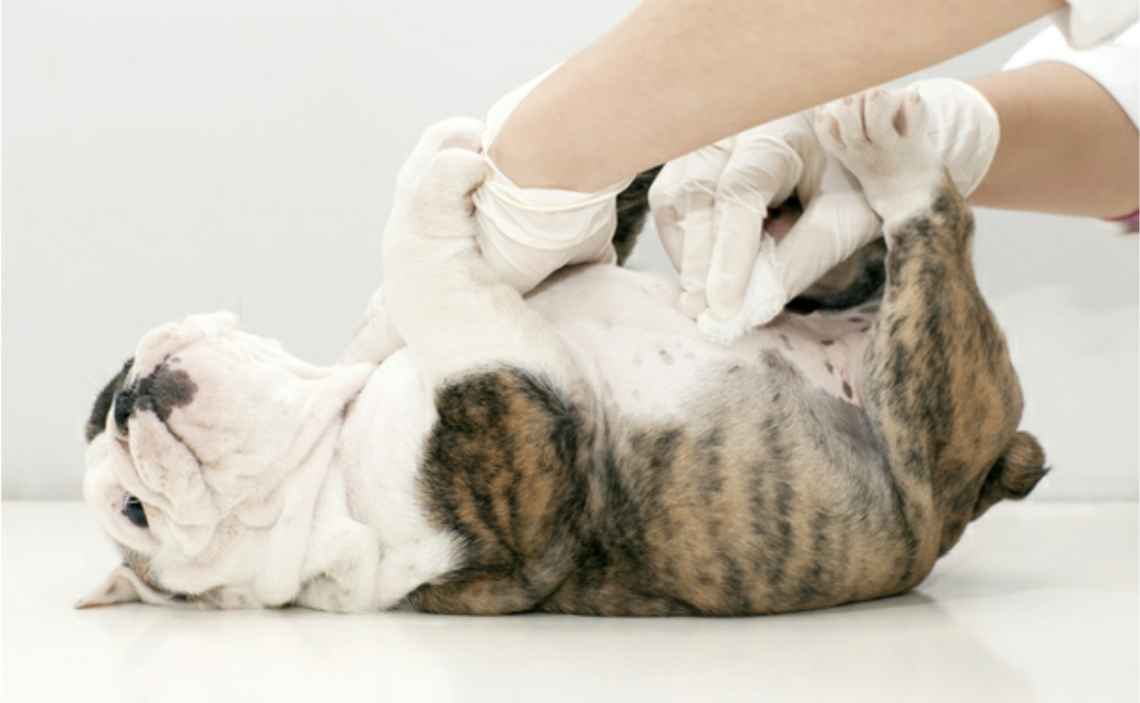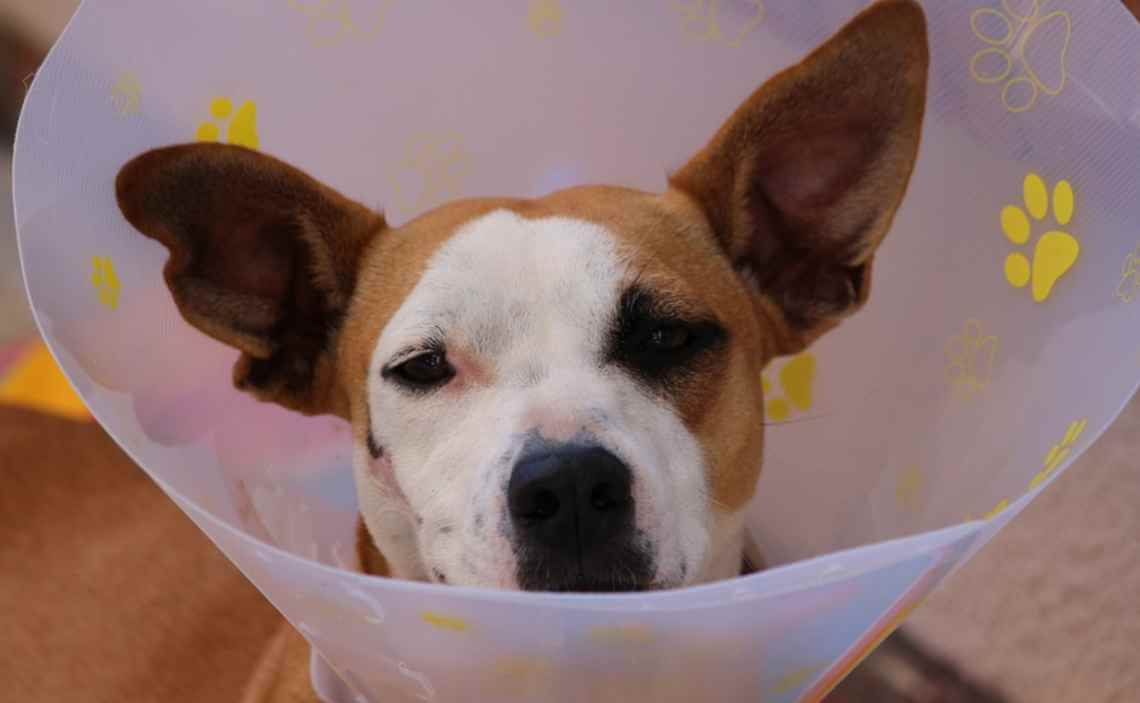
Canine hernias are relatively common. Similar to humans, a hernia is a condition where the contents of a dog’s abdomen pushes through a tear or hole in the muscle wall or fatty tissue. Puppies are commonly born with them. Over 90 percent of canine hernia cases are due to genetics. Hernias can also develop from trauma or injury.
Common Types of Dog Hernias
There are five common types of hernias in dogs. Hernias are categorized as either congenital – meaning puppies are born with it – or develop due to trauma.
The types of canine hernias include:
-
Umbilical hernia
The is the most common type for hernias in puppies. You will notice this as a squishy protrusion near your puppy’s belly button. Sometimes these can heal on their own. However, they may need to be surgically fixed when your puppy is neutered. It’s usually best to consult your veterinarian and they will advise on the best way to proceed.
-
Inguinal hernia
These occur in the groin area where the inner fold of your dog’s hind leg attaches to their body. They can range in size and if they’re large enough, parts of the bladder or uterus may get trapped, which could be life threatening. These are the most common in middle-aged female dogs, especially when they’re pregnant.
-
Diaphragmatic hernia
This type of dog hernia is due to a hole in the diaphragm, which is a muscle that separates the chest and the abdomen. This hole allows internal organs to enter your dog’s chest cavity, which can cause breathing difficulty. Dogs are usually born with a diaphragmatic hernia.
-
Perineal hernia
A perineal hernia is caused by a tear in the pelvic muscle. This type is most common in male dogs over the age of five which haven’t been neutered. Certain breeds of dogs can be predisposed to this, including Welsh Corgis, Boston Terriers, Boxers and Collies.
-
Hiatal hernia
Hiatal hernias in dogs generally are caused by injury or trauma. The opening in the diaphragm can sometimes be large, which allows the stomach to enter the chest cavity. The stomach can pass through this hole and most commonly slips back and forth between the chest abdomen. These types of hernias are common in English Bulldogs and other brachycephalic breeds.
Symptoms of Dog Hernias
If a dog develops a hernia, symptoms may include:
- Vomiting
- Loss of appetite
- Cramping
- High fever
- Leg numbness
- Lethargy
- Swelling
- Shortness of breath
- Excessive drooling
Diagnosis of Canine Hernias
If you suspect your dog may have a hernia, you should take them to a veterinarian immediately. Sometimes a hernia will be visible, or your vet may diagnosis it during an exam. If your dog’s hernia is not easy to identify, your vet may have to do x-rays to see the hernia. Additionally, an abdominal ultrasound may be required. Your vet will also be on the lookout for any respiratory or abdominal disorder and any painful or hard bulges.
Treatment for Canine Hernias
The good news is that canine hernias are treatable. A simple surgery is usually required to correct the hole and to replace the abdominal contents back into the abdomen.
If your dog is not already spayed or neutered, then your vet will most likely recommend the procedure at the same time the hernia is repaired, as it can prevent future hernias from developing. If the hernia is congenital, it’s usually advised that you neuter the dog to prevent breeding them, in order to prevent passing the condition on to the next generation.

It’s important that a dog with a hernia receives medical treatment as soon as possible. Puppies do not outgrow a hernia and hernias don’t heal over time. An untreated hernia can result in a great amount of pain for your dog and could lead to medical complications.
Have you had a dog with canine hernia? What was your experience? Please share with the rest of the Canine Campus community in the comments below…

 Is Your Dog Too Old to Walk? Here’s How to Tell and What to Do
Is Your Dog Too Old to Walk? Here’s How to Tell and What to Do A Guide to Laser Therapy for Dogs
A Guide to Laser Therapy for Dogs 9 Common Eye Issues in Dogs
9 Common Eye Issues in Dogs What to Put in a Dog First Aid Kit
What to Put in a Dog First Aid Kit 8 Eco-Friendly Tips for Dog Owners
8 Eco-Friendly Tips for Dog Owners






I have a miniature dobiment pincher about 3 yrs old female she has a buldge I took her to the vet $508 I was told it’s not cancer or a timer it’s gotten bigger I don’t got the money to have it fixed my poor Beauty girl is so uncomfortable what can I do
Give your local Humane Society a call. Explain the situation. Sometimes there are veterinarians who offer pro bono or sliding scale fees. Hope your dog feels better soon!
Hello I have a miniature poodle his name is Cheewy. Cheewy had surgery back in June 2020 he was diagnosed with an inguinal hernia and a perennial I took him to k-state for his surgery and at the time they wanted to charge me $4500 of course I didn’t have that kind of money at hand so I went and got a title loan for 1200 when I got to K state the veterinarian took care of the inguinal hernia since it was most critical, some intestine wrapped in it affected the bladder as well as the colon. Long story short I believe I got a good deal only spending $900. I mean you figured the medication the procedure and three days hospitalization is not very bad for that price. But now his perennial hernia has seem to have gotten worse it looks as if it’s gotten fatter it’s to the point where it looks as if my baby has a human butt. It also looks as if his anus has been slightly twisted to the right when he jumps up on the furniture his rear end seems to hold him back. K state still wants to charge me $4500 my question is isn’t there somewhere besides the Humane Society because if the Humane Society and the Animal Shelter are the same place I’m not gonna get anywhere isn’t there somewhere I can ask for some type of assistance I have $1500 that I can put on my dog surgery but I cannot come up with the remaining. I am just recovering from COVID-19 I do have documentation if you need it and I am catching up on some bills that I was not able to pay due to being out of work how can you help me please my baby is beginning to suffer thank you
Tina, I’m sorry to hear your pup is having such a hard time. Some communities do have veterinarian services at a reduced rate or sliding scale. Usually the Humane Society will be able to point you in the right direction. Another idea is to call 211 which is usually manned by your local United Way. They may be able to give you a list of places in your community that offer lower rates. Good luck and I hope your dog feels better soon!
Our male chiquaha about 10 months old shows a small round bulge of a hernia on his abdomen. When should he have surgery
Thanks for stopping by our blog, Luann. We recommend you contact your veterinarian to make a plan for surgery.
What is the normal $$$ Cost to fix a hernia by the groin in a puppy born in November 2020.
And When would be the “Safe Opperation age of a puppy, we have a vet appt. And have had for the better part of 2 weeks. THANKS TO THIS STUPID “COVID 19- THE GOVERNMENTS MADE UP!! it’s near impossible to get into ANY VET!!
OUR APPT. IS ABOUT 3 DAYS AWAY NOW. HOWEVER SHE IS GETTING WORSE BY THAT I MEAN A LARGER SPOT PRETRUDING.
THANK YOU 4 YOUR TIME.
Thanks for stopping by the Canine Campus blog. We are a dog boarding, daycare and grooming facility and do not have veterinary medicine training. Hopefully you have already been in to see a local veterinarian and were able to make a plan for surgery. We hope your puppy is feeling better by now!
Our mutt (shepherd/lab maybe) was spayed last week at 5 months old by the SPCA. They found a hernia during surgery and called to ask if we wanted it repaired during the surgery. It cost an extra $55. Our entire bill was $190. It included all her 2nd shots, a chip, spaying and the hernia repair.
Thank you for sharing your experience on the Canine Campus blog.
Can I ask where you’re from and how you paid so little??
My small rat terrior has a large hernia between her legs the size of an egg, I can’t afford surgery. How long can I expect her to live before she dies with this?
I’m so sorry to hear about your dog’s hernia. Have you looked for veterinarians in your area that will provide services on a sliding scale or pro bono? Many communities have veterinarian hospitals that will provide low cost or sliding scale services. If you’re not able to find something by searching online, try calling a local veterinarian and ask if they know of a place you can take your pup. We are not veterinarians and cannot predict how long your dog will live but I do hope you are able to make sure your dog is as comfortable as possible. I’m sorry you’re going through this with your dog.